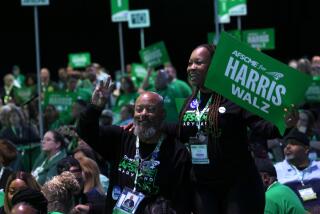The Times Poll : Dukakis Far From Uniting Democrats for November
- Share via
PHILADELPHIA — Although Massachusetts Gov. Michael S. Dukakis took another big step toward winning the Democratic presidential nomination on Tuesday, interviews with Pennsylvania voters by the Los Angeles Times Poll showed that he still has a long way to go before unifying the party for the November election.
Dukakis has a delicate, twofold problem, the survey illustrated: He must persuade skeptical supporters of the Rev. Jesse Jackson to go to the polls and loyally vote for the Democratic nominee, while not offending many of his own supporters by being perceived as kowtowing to Jackson and thereby driving them into the Republican camp.
What makes this an especially delicate task is the racial polarization that has developed during the primary and caucus campaigns as Dukakis has outfought his white rivals in a war of attrition while Jackson has galvanized blacks into a solid, strongly committed support base.
Interviews by the Times poll with 4,093 Pennsylvanians after they had cast their ballots showed that Dukakis attracted 81% of the white vote but only 5% of the blacks. Jackson, on the other hand, drew 93% of the black vote but just 13% of the whites.
Whites who voted for Jackson tended to be well-educated, affluent liberals. Nearly two-thirds had at least some college education and half held degrees.
Jews, continuing a growing trend, sided overwhelmingly with Dukakis--by 11 to 1.
The Times survey showed that Jackson was viewed highly negatively by Dukakis’ supporters, with only 22% voicing a favorable impression of the civil rights leader, contrasted with 47% unfavorable. Jackson’s supporters were more tolerant of Dukakis, indicating that they probably can be persuaded to vote for the Massachusetts governor in the fall, but their attitude is now lukewarm at best: 32% favorable, 25% unfavorable and 43% “no opinion.”
The weeklong Pennsylvania primary campaign essentially was a tame affair with none of the angry rhetoric that bitterly divided New York voters along racial and religious lines seven days earlier. The placid, cautious campaigning of the past week apparently resulted in making Dukakis more acceptable here to Jackson’s supporters, who in New York had a slightly unfavorable impression of the governor. But Jackson’s image among Dukakis’ supporters did not significantly improve between the New York and Pennsylvania contests.
Fewer Liberals Than N.Y.
Pennsylvania’s Democratic electorate was more conservative than New York’s. And this may well have been at the root of the white voters’ continued hostility toward Jackson despite the subdued campaign rhetoric. Only about one-third of Pennsylvania’s Democrats described themselves as liberals, whereas about half of New York’s voters did.
What ultimately could alienate many Dukakis supporters in Pennsylvania, the poll indicated, would be for him to choose Jackson as his running mate. Although voters were not queried specifically about the second spot on the ticket, they were asked to assess Jackson’s electability as President. And by 3 to 2, Dukakis’ supporters said Jackson “cannot be elected President.” Jackson’s supporters, not surprisingly, disagreed with this notion by 5 to 1.
In addition, nearly 6 in 10 of Dukakis’ supporters said Jackson should not be nominated for President--even if he goes to the Democratic National Convention with the most delegates--if giving him this prize would cost the party the election in November.
‘Element of Racism Involved’
The overwhelming feeling among Jackson’s supporters--roughly 8 in 10 of them--was that “there is an element of racism involved” in voting against their candidate. And a solid majority of Dukakis’ supporters agreed.
Tending to bolster this thesis, 4 in 10 of Dukakis’ supporters said that “the government pays too much attention to blacks and other minorities.” Only one-fourth said that “too little attention” is paid. By contrast, 8 in 10 of Jackson’s voters believed that the government should do more for minorities.
In Pennsylvania, as elsewhere, Jackson exhibited a staunchly dedicated support base that would be the envy of any candidate. More than two-thirds of his supporters said they backed him “very strongly.” By contrast, less than half of Dukakis’ supporters felt that way about their candidate.
The interviews show that Dukakis has benefited significantly during the 1988 campaign from events beyond his control.
Former Hart Supporters
For example, one in five of Dukakis’ voters on Tuesday said their original choice for the nomination was former Colorado Sen. Gary Hart, who dropped out of the contest last May amid a sex scandal, then re-entered unsuccessfully in December. Also, 16% of Dukakis’ backers said they originally had rooted for a Republican to win the presidency--which, obviously, means that they still could again before the November election.
Another indication of the lack of commitment of many Dukakis voters in Pennsylvania was that almost half said they would have supported New York Gov. Mario M. Cuomo if he had chosen to become a candidate. Only one-fifth of Jackson’s voters said they would have sided with Cuomo.
Additionally, a full third of Dukakis’ supporters said they had decided only since the New York primary to vote for the Massachusetts governor. By contrast, 7 in 10 of Jackson’s supporters said they had commited themselves to the civil rights leader by at least Super Tuesday (March 8).
Experience, Trust Cited
What mainly attracted voters to Dukakis, they told the Times poll, were his “experience in government,” their “trust” in him, his ability “to get the job done,” their belief that he “represents the Democratic Party Establishment” and the feeling that “he has the best chance to win in November.” What Dukakis supporters basically said about Jackson was that “he has no experience in government.”
Jackson’s voters said they mostly were drawn to their candidate because “he seems to care about people like me” and “he has strong qualities of leadership.” Their view of Dukakis essentially was that “he doesn’t have a message” and “he’s too bland.”
Although the Democratic Party in Pennsylvania clearly was splintered by race on Tuesday, the Times interviews pointed up some obvious opportunities for Dukakis to unify these voters in November, assuming that he is the nominee.
For example, supporters of Dukakis and Jackson had basically the same priorities concerning issues. They agreed that the federal budget deficit and unemployment are “the most important”--with Dukakis’ supporters leaning more toward the former and Jackson’s the latter. Beyond that, however, people who supported Dukakis were more inclined to consider foreign trade an important issue, whereas Jackson voters were more concerned about “morality in government.”
Also, the vast majority of both candidates’ supporters said “things in the nation have gotten off on the wrong track”--an attitude that does not bode well for Republican Vice President George Bush in the fall. And by roughly 9 to 1, Pennsylvania’s Democrats think that “we need a basic change in the way things are being run in this country.”
Dukakis won among every demographic group except blacks. He was particularly strong among older people, Roman Catholics and European ethnic groups.
The Times Poll is directed by I. A. Lewis. The margin of error for a survey of this size is 3 percentage points in either direction.
A HINT OF CLOSING RANKS
In Pennsylvania, Jackson supporters regarded Dukakis more favorably than had Jackson supporters in New York a week earlier. There was little change, however, in the attitude of Dukakis supporters toward Jackson.
How Jackson supporters feel about Dukakis:
In New York In Pennsylvania Favorable 23 32 Unfavorable 35 25 No Opinion 42 43
How Dukakis supporters feel about Jackson:
In New York In Pennsylvania Favorable 24 22 Unfavorable 53 47 No Opinion 23 31
Source: Los Angeles Times Poll
More to Read
Get the L.A. Times Politics newsletter
Deeply reported insights into legislation, politics and policy from Sacramento, Washington and beyond. In your inbox twice per week.
You may occasionally receive promotional content from the Los Angeles Times.










